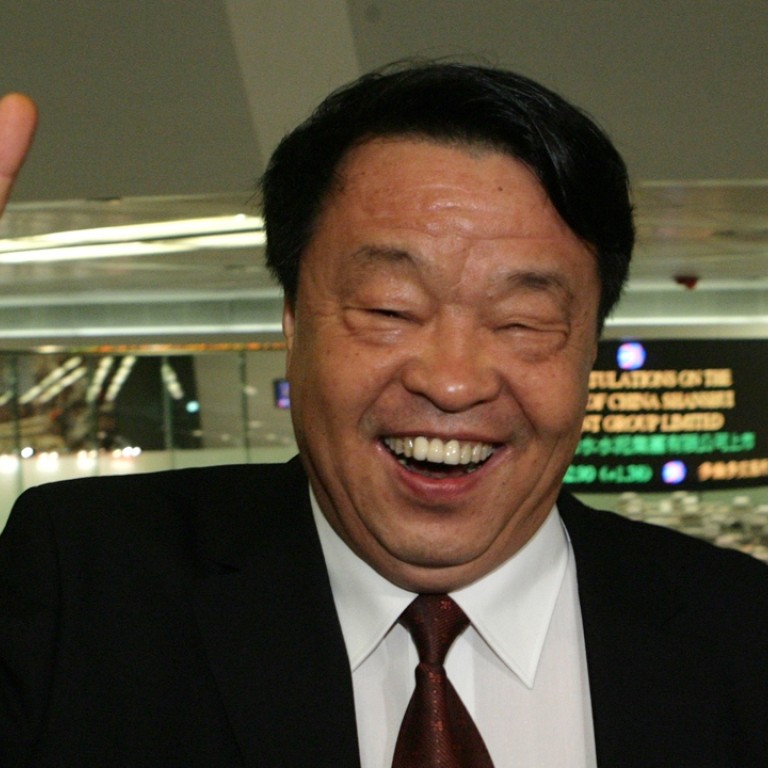
New | Bitter boardroom battle in China Shanshui Cement sees old board thrown out as accusations fly
Receiver accuses chair Zhang Bin and father of using ‘poison pill’ to damage company
The battle for control of the China Shanshui Cement Group has gotten a lot uglier as shareholders threw out the entire board controlled by chairman Zhang Bin and appoint a new set of officials.
One group voted to oust the entire board and appoint new directors, while a receiver of its second largest shareholder accused ousted chairman Zhang Bin and his father and company founder Zhang Caikui of illegally changing its main operating subsidiary’s article of association to tighten their grip.
In the latest twist of a seven-month long brawl, 96 per cent of shareholders votes cast in a meeting on Tuesday chose to throw out all eight directors of the firm including Zhang Bin, and to appoint nine new ones. Zhang’s father had already been ousted by shareholders in October.
After the maiden meeting of the new board following the vote, Stephen Liu Yiu-keung, managing director of transaction advisory services at accountancy EY and a receiver of parent China Shanshui Investment, said the amendment of the article of association took place on October 14.
“It was a last ditch attempt by the two Zhangs to create problems for China Shanshui Cement’s shareholders ... they have tried every means to prevent the other shareholders from exercising their rights, it is one of the most outrageous examples [of corporate misdeeds] I have seen,” Liu said.
The two Zhangs, through China Shanshui Investment, own less than 5 per cent of China Shanshui Cement, but control the latter’s board and have done things that damaged the interest of the remaining 95 per cent shareholders, he alleged.
The Zhangs were not at Tuesday’s shareholders meeting and could not be reached for comments.
The alleged amendment was discovered on Tuesday when a company registration filings search was done on China Shanshui Cement’s principal subsidiary Shandong Shanshui Cement Group, Liu told reporters after the new board’s meeting.
The search was part of the receivers’ effort to uncover why China Shanshui Cement defaulted on the repayment of a two billion yuan mainland bond earlier this month despite having 3.5 billion yuan in cash as indicated by China Shanshui Cement’s lawyer in a Hong Kong High Court hearing on October 29, he added.
The amended articles of association stipulates that the two Zhangs cannot be removed from the three-member board of China Shanshui Cement’s Shandong subsidiary during their three year terms by other China Shanshui Cement shareholders, Liu said.
“We are seeking legal advice on the situation,” he said, adding the company does not rule out reporting the matter to mainland Chinese police and will hire lawyers to handle any litigation that may be filed by Zhang’s group.
China Shanshui Cement is incorporated in the Cayman Islands and is one of a clutch of mainland companies which have defaulted on a domestic bond this year.
But Liu said the company net assets of around HK$10 billion and accused the Zhangs of “purposely” not repaying the debt to avoid being removed from China Shanshui Cement’s board.
Its liquid assets include several hundred million of yuan of cash, over one billion yuan of accounts receivables and some 600 million yuan of pre-payments, he added.
He accused the Zhangs of engineering a term in a US$500 million bond issued by China Shanshui Cement, so that if they are removed from the board, the bondholders have the right to demand an immediate redemption of the bond by the company.
This would cause financial hardship for the firm.
“The new board’s priority is to deal with the US$500 million offshore bond as well as some seven billion yuan of mainland bonds’ possible redemption, after the board’s reshuffling,” Liu said.
He also accused the Zhangs of mismanaging China Shanshui Cement’s finances, saying management’s explanation that the firm’s falling into a net loss of 992 million yuan in the year’s first six months from a profit of 167.9 million yuan in the year-earlier period was “unacceptable.”
He pointed out that the increase in administration expense to 851.3 million yuan from 572.8 million yuan in the period was largely caused by hefty legal bills and other administration fees that should have been cut as its rivals have done amid the industry downturn.
Shanshui Cement is 28.1 per cent-owned by Tianrui Group - parent of Hong Kong-listed China Tianrui Group Cement - a major cement maker in Henan and Liaoning provinces, 25.1 per cent by China Shanshui Investment, 20.9 per cent by Taiwan-listed Asia Cement Corp and 16.6 per cent by state-backed Hong Kong-listed China National Building Material.
China Shanshui Cement’s troubles began in April when it said two former senior managers were investigated by the mainland Security Bureau for alleged misappropriation of funds when they were working for the firm.
It shares were suspended from mid-April, as stake increases by the four largest shareholders meant only 9.2 per cent of its shares are owned by other public shareholders, falling below the 25 per cent required by listing rules to be owned by the investing public.
In May, 2,426 employees of China Shanshui Cement filed writs at Hong Kong’s High Court against Zhang Caikui and the firm’s ex-director Li Yanmin in a dispute over ownership of shares in parent China Shanshui Investment.
Zhang Caikui was the employees’ trustee in managing the affairs of the parent firm, Liu said.
Asked when China Shanshui Cement’s shares may resume trading, he said it is not possible before its operations return to “normal” and the bond redemption crisis is resolved.

